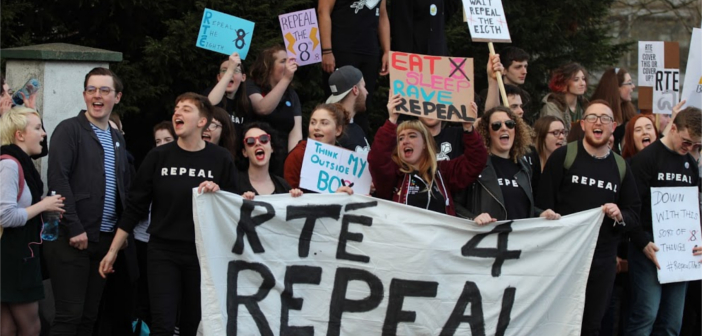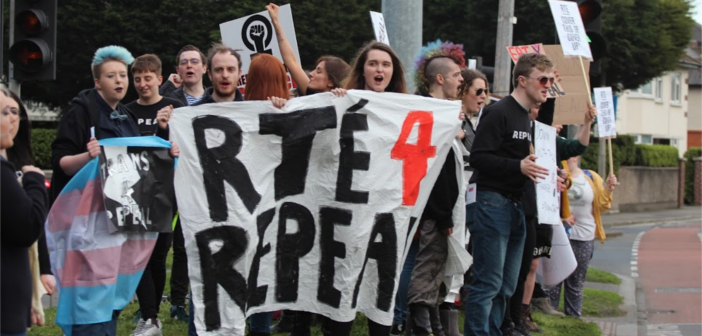Setting the Record Straight | Great Anger at the ‘RTÉ Recognition 4 Repeal’ Protest
On March 8th, an estimated 10,000 people partook in a march in Dublin to protest Ireland’s Eighth Amendment, which positions the life of the unborn as equal to that of its mother. This restricts abortion access for Irish women and forces many to travel to the UK in order to avail of the country’s more progressive abortion laws. According to the website of the Irish Family Planning Association, approximately 166,951 women traveled to the UK between 1980 and 2015 in order to make use of this legislation. The mental and physical toll of this journey, coupled with the stigma many face upon a return to their native country, has been a subject of great anger for campaigners since the Eighth Amendment’s implementation in the October of 1983.
Although the march attracted a lot of media attention both at home and abroad, appearing on CNN and Buzzfeed, Ireland’s national broadcaster, RTÉ, instead focused its news report last Wednesday on the worldwide significance of International Women’s Day, neglecting to mention the implications of such a movement in Ireland. They did not reference attendance figures, the Eighth Amendment, and also dedicated equal time during the broadcast to the rise in stamp prices.
[pullquote]”We set this up basically because we shut down the city twice last Wednesday, there were marches all over the country, we had solidarity come in from all over the world, and [there wasn’t] a peep from RTÉ. We decided to bring the story to their doorstep.”[/pullquote] This angered activists Eva Griffin, Sadhbh Ní Bhroin and Síofra Dempsey, who together organised a protest outside RTÉ studios on Monday, March 13th, in order to hold the broadcaster to account for its blatant misrepresentation of the march. Speaking at the protest, Ní Bhroin outlined the reasons for organising such an event: “We set this up basically because we shut down the city twice last Wednesday, there were marches all over the country, we had solidarity come in from all over the world, and [there wasn’t] a peep from RTÉ. We decided to bring the story to their doorstep.”

Echoing Ní Bhroin’s comments was co-organiser Eva Griffin: “After the strike and march on Wednesday, I saw a lot of people […] complaining online about the RTÉ coverage, which consisted of […] ten seconds of the strike, which they actually bought from another source, used as a segue into a story on the gender pay gap, which is obviously important, but they skipped over the biggest story in Ireland at the time.”
Also at the event was Síofra Dempsey: “The purpose […] is to make it clear to RTÉ, and to the state, that they can’t ignore the issue of Repeal the 8th. It’s something they want to sweep under the rug and pretend isn’t happening, and by not reporting [on the march], RTÉ are directly colluding with the state in covering up, so we want to make that impossible for them in organising a protest.”
Griffin set up the Facebook page ‘RTE Recognition 4 Repeal’ late last week, and overnight it attracted hundreds of interested participants. This was down to support from the Strike for Repeal movement, Trinity for Choice, UCD for Choice, ROSA, Amnesty Ireland’s Colm O’Gorman, and People Before Profit.
Griffin continues: “The Facebook group blew up. Between attending and interested, there was over 1000 people.” The protest on the day attracted approximately 90 participants who joined together in chants of “Hey hey RTÉ / Put the strike on our TV,” and “Enda, Enda / We want a referendum.”
The protest began at 4:30pm outside RTÉ’s side entrance at Nutley Lane, and eventually moved to Stillorgan Road where it continued until 6:30pm. It attracted attention from the Pro-Life Campaign and Liberal.ie’s Cora Sherlock, who is a noted Pro-Life advocate.

In attendance at the protest was MA student Aisling Fulcher, who noted the broadcaster’s hypocrisy in claiming to be non-biased: “They obviously show a centre-right leaning [in not reporting the march], and if they say it’s their responsibility to provide fair and equal coverage, they should do that. They should do [their] job.”
[pullquote]“[It’s important] that there’s more inclusion and intersectionality. With trans people and non-binary people, it’s a discussion that affects us too. Abortion is always talked about as a woman’s issue, but it also affects non-binary people and trans men, and there are added traumas they might have to go through as well”[/pullquote] Representing Non-Binary+ Ireland at the protest was Kay Cairns, who spoke about a neglected minority in debates surrounding the Eighth Amendment: “[It’s important] that there’s more inclusion and intersectionality. With trans people and non-binary people, it’s a discussion that affects us too. Abortion is always talked about as a woman’s issue, but it also affects non-binary people and trans men, and there are added traumas they might have to go through as well – such as being misgendered at an abortion clinic, or having terms used to describe our bodies that we might not use ourselves.”
“I say it’s important for trans and non-binary people to be included in these marches, but I do see the value in highlighting how much it is a women’s issue as well, because it’s a symptom of the systematic oppression of women. When legislators are making laws like the Eighth Amendment, they’re not thinking about trans or non-binary people, of course, so I do think it’s important we put women at the centre of that, but it is also important to talk about the trans and non-binary people that it affects.” Cairns led the crowd in a chant of ‘Trans for Repeal / Trans for Repeal.’
RTÉ sent out two cameramen at different times during the protest in order to record the event. Despite this, the event did not receive mention on either the Six One News or Nine O’Clock News that evening despite interest. Instead the event was mentioned in the ‘News in Brief’ section of RTÉ’s website. On this, Ní Bhroin stated: “It was a challenge for them to prove us wrong and give the movement some coverage but they didn’t step up. Normally I love being right but this time [I] was bitter.”
Featured Image by Louise Flanagan
